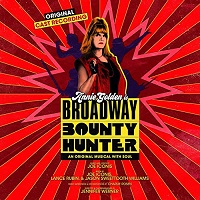 Original Off-Broadway Cast, 2020 (Ghostlight)
Original Off-Broadway Cast, 2020 (Ghostlight)  (4 / 5) Here’s a highly enjoyable cast album of a fun show with a fanciful, meta-theatrical concept, built around the dynamic singer-actress Annie Golden, who started out as the leader of the punk band The Shirts before going on to play Jeannie in the film version of Hair, then to numerous other film, TV, and stage roles. In Broadway Bounty Hunter, Golden played a highly fictionalized version of herself caught up in a crazy plot involving — well, bounty hunting. The show was (obviously) crafted specifically for her by the super-talented composer-lyricist Joe Iconis, working in collaboration with co-book writers Lance Rubin and Jason Sweettooth Williams. It would have been interesting to see if Broadway Bounty Hunter would have worked with other performers as replacements in the title role, but the show had a very limited Off-Broadway run, and there was no transfer to an open-ended engagement on Broadway or anywhere else. So it’s nice to have Iconis’s clever, tuneful, post-modern theatrical rock and pop songs preserved on this well produced cast album. Golden’s strong, exciting voice and her abundance of charisma come through big-time in a clutch of songs, from the roof-raising “Woman of a Certain Age” (wisely used as both the show’s opener and closer) to the soulful “Spin Those Records” and the intense, hard-rocking 11 o’clock number “Veins.” Other major voices and personalities heard on the album include Badia Farha, Alan H. Green, Christina Sajous, Emily Borromeo, and the always welcome Brad Oscar. A kick-ass band is led by conductor/musical director Geoffrey Ko, and Joel Waggoner’s vocal arrangements are excellent. Given the lack of commercial success of both Broadway Bounty Hunter and Iconis’s Be More Chill, at least in their NYC runs, it’s devoutly to be wished that he’ll soon have the major hit he deserves. — Michael Portantiere
(4 / 5) Here’s a highly enjoyable cast album of a fun show with a fanciful, meta-theatrical concept, built around the dynamic singer-actress Annie Golden, who started out as the leader of the punk band The Shirts before going on to play Jeannie in the film version of Hair, then to numerous other film, TV, and stage roles. In Broadway Bounty Hunter, Golden played a highly fictionalized version of herself caught up in a crazy plot involving — well, bounty hunting. The show was (obviously) crafted specifically for her by the super-talented composer-lyricist Joe Iconis, working in collaboration with co-book writers Lance Rubin and Jason Sweettooth Williams. It would have been interesting to see if Broadway Bounty Hunter would have worked with other performers as replacements in the title role, but the show had a very limited Off-Broadway run, and there was no transfer to an open-ended engagement on Broadway or anywhere else. So it’s nice to have Iconis’s clever, tuneful, post-modern theatrical rock and pop songs preserved on this well produced cast album. Golden’s strong, exciting voice and her abundance of charisma come through big-time in a clutch of songs, from the roof-raising “Woman of a Certain Age” (wisely used as both the show’s opener and closer) to the soulful “Spin Those Records” and the intense, hard-rocking 11 o’clock number “Veins.” Other major voices and personalities heard on the album include Badia Farha, Alan H. Green, Christina Sajous, Emily Borromeo, and the always welcome Brad Oscar. A kick-ass band is led by conductor/musical director Geoffrey Ko, and Joel Waggoner’s vocal arrangements are excellent. Given the lack of commercial success of both Broadway Bounty Hunter and Iconis’s Be More Chill, at least in their NYC runs, it’s devoutly to be wished that he’ll soon have the major hit he deserves. — Michael Portantiere
Category Archives: A-C
Be More Chill
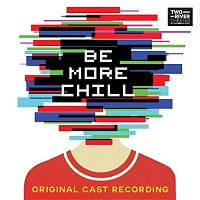 Original Cast, Two River Theater, 2015 (Ghostlight)
Original Cast, Two River Theater, 2015 (Ghostlight)  (4 / 5) Based on a novel by Ned Vizzini, Be More Chill is a cautionary tale about a loner teenager named Jeremy Heere who attempts to become “chill” by ingesting something called a “squip” (super quantum unit Intel processor), which winds up controlling his thoughts and actions. The show premiered at the Two River Theater in Red Bank, New Jersey for a one-month limited run in 2015. That production received mixed reviews, but this cast recording gained huge popularity via internet streaming and downloads, eventually sparking the Off-Broadway production of 2018 and the subsequent Broadway transfer (see below). Even if it’s hard to explain exactly how the score “went viral,” it’s easy to understand why it did: Composer-lyricist Joe Iconis has a firm grounding in the classic musical theater canon, and a great talent for being able to wed traditional song structures and other methods of craft with an up-to-the-minute sound and sensibility. Listen to the opener, “More Than Survive,” a spot-on, character-establishing, “I want” song for Jeremy that begins as follows: “C-c-c-come on, c-c-c- come on! Go, go! I’m waiting for my porn to download.” (The album has an “explicit lyrics” label.) Or sample “The Smartphone Hour (Rich Set a Fire),” a super-clever takeoff on “The Telephone Hour” from Bye Bye Birdie. Also quite amusing is Iconis’s depiction of present-day high school theater subculture, as in “I Love Play Rehearsal.” The pretty much ideal cast heard here is led by Will Connolly as a charmingly nerdy Jeremy, with Eric William Morris as The Squip; George Salazar as Jeremy’s staunch friend, Michael; Stephanie Hsu as Christine, the girl with whom Jeremy’s obsessed; and Gerard Canonico in a ball-of-fire performance as Rich, the ill-fated guy who turns Jeremy on to The Squip. Salazar does a tour-de-force job with arguably the best song in the score, the one that became the biggest viral phenomenon of all: “Michael in the Bathroom,” an affecting expression of teen angst. — Michael Portantiere
(4 / 5) Based on a novel by Ned Vizzini, Be More Chill is a cautionary tale about a loner teenager named Jeremy Heere who attempts to become “chill” by ingesting something called a “squip” (super quantum unit Intel processor), which winds up controlling his thoughts and actions. The show premiered at the Two River Theater in Red Bank, New Jersey for a one-month limited run in 2015. That production received mixed reviews, but this cast recording gained huge popularity via internet streaming and downloads, eventually sparking the Off-Broadway production of 2018 and the subsequent Broadway transfer (see below). Even if it’s hard to explain exactly how the score “went viral,” it’s easy to understand why it did: Composer-lyricist Joe Iconis has a firm grounding in the classic musical theater canon, and a great talent for being able to wed traditional song structures and other methods of craft with an up-to-the-minute sound and sensibility. Listen to the opener, “More Than Survive,” a spot-on, character-establishing, “I want” song for Jeremy that begins as follows: “C-c-c-come on, c-c-c- come on! Go, go! I’m waiting for my porn to download.” (The album has an “explicit lyrics” label.) Or sample “The Smartphone Hour (Rich Set a Fire),” a super-clever takeoff on “The Telephone Hour” from Bye Bye Birdie. Also quite amusing is Iconis’s depiction of present-day high school theater subculture, as in “I Love Play Rehearsal.” The pretty much ideal cast heard here is led by Will Connolly as a charmingly nerdy Jeremy, with Eric William Morris as The Squip; George Salazar as Jeremy’s staunch friend, Michael; Stephanie Hsu as Christine, the girl with whom Jeremy’s obsessed; and Gerard Canonico in a ball-of-fire performance as Rich, the ill-fated guy who turns Jeremy on to The Squip. Salazar does a tour-de-force job with arguably the best song in the score, the one that became the biggest viral phenomenon of all: “Michael in the Bathroom,” an affecting expression of teen angst. — Michael Portantiere
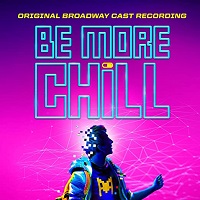 Original Broadway Cast, 2019 (Ghostlight, 2CDs)
Original Broadway Cast, 2019 (Ghostlight, 2CDs)  (4 / 5) Buoyed by the extraordinary online popularity of its score, as described above, Be More Chill was presented Off-Broadway at the Irene Diamond Stage at the Pershing Square Signature Center in the summer of 2018, with plans for a move to Broadway already largely in place at that time. This production featured several cast members from the Two River Theater production mentioned above, including Stephanie Hsu, George Salazar, and Gerard Canonico reprising the roles they originated. New cast members included Will Roland as Jeremy, Jason Tam as the Squip, Tiffany Mann as Jenna, Britton Smith as Jake, and Jason “Sweettooth” Williams as Mr. Heere, but not all of these changes were improvements; for example, Roland’s performance doesn’t have quite the likeability of Connolly’s, and Smith is miscast. On the plus side, Tam makes the role of The Squip very much his own with his strong, distinctive voice and his very funny Keanu Reeves imitation. The score is well performed as heard here, with some relatively minor rewrites and additions to the material. (This album is longer than the original, 24 tracks as compared to 21.) Both the Off-Broadway and Broadway productions of Be More Chill were marred by painfully loud sound amplification, which may have been partly responsible for the brief 2019 Broadway run (only 177 performances) of a show that many had expected to be a big hit, so the fact that listeners to the cast album can control the volume is a huge plus for the experience. Music and lyrics this good don’t need to be blasted at an audience; on the contrary, any score suffers greatly rather than benefits from such treatment, a lesson that Iconis and his colleagues will hopefully learn for future productions of his shows. — M.P.
(4 / 5) Buoyed by the extraordinary online popularity of its score, as described above, Be More Chill was presented Off-Broadway at the Irene Diamond Stage at the Pershing Square Signature Center in the summer of 2018, with plans for a move to Broadway already largely in place at that time. This production featured several cast members from the Two River Theater production mentioned above, including Stephanie Hsu, George Salazar, and Gerard Canonico reprising the roles they originated. New cast members included Will Roland as Jeremy, Jason Tam as the Squip, Tiffany Mann as Jenna, Britton Smith as Jake, and Jason “Sweettooth” Williams as Mr. Heere, but not all of these changes were improvements; for example, Roland’s performance doesn’t have quite the likeability of Connolly’s, and Smith is miscast. On the plus side, Tam makes the role of The Squip very much his own with his strong, distinctive voice and his very funny Keanu Reeves imitation. The score is well performed as heard here, with some relatively minor rewrites and additions to the material. (This album is longer than the original, 24 tracks as compared to 21.) Both the Off-Broadway and Broadway productions of Be More Chill were marred by painfully loud sound amplification, which may have been partly responsible for the brief 2019 Broadway run (only 177 performances) of a show that many had expected to be a big hit, so the fact that listeners to the cast album can control the volume is a huge plus for the experience. Music and lyrics this good don’t need to be blasted at an audience; on the contrary, any score suffers greatly rather than benefits from such treatment, a lesson that Iconis and his colleagues will hopefully learn for future productions of his shows. — M.P.
Anything Can Happen in the Theater: The Musical World of Maury Yeston
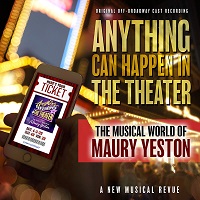 Original Off-Broadway Cast, 2019 (PS Classics)
Original Off-Broadway Cast, 2019 (PS Classics)  (4 / 5) Maury Yeston is one of the finest and most versatile musical theater composer-lyricists of his era, so it’s good to have this cast album of a very enjoyable and well-crafted revue of his work that was presented Off-Broadway by the York Theatre Company in 2019, directed by Gerard Alessandrini of Forbidden Broadway fame. The program includes songs from Yeston’s most famous shows, with one major exception (see below), along with a healthy sampling of less-well-known material. From Nine, we have the bravura number “Guido’s Song” and the lyrical “Only With You,” both rendered with lovely tenor tone by Benjamin Eakeley, as well as the gorgeous “Unusual Way” and the wittily seductive “A Call From the Vatican,” two fine showcases for the talents of Mamie Parris. Also to be found here is “Cinema Italiano,” written by Yeston expressly for the film version of Nine, performed with verve by Parris, Justin Keyes, and Jovan E’Sean. Two selections from Grand Hotel, for which Yeston contributed much but not all of the score (to augment songs previously written by Wright and Forrest for an earlier incarnation of the show), are the passionate “Love Can’t Happen” (Eakeley) and the delightful “I Want to Go to Hollywood” (Parris). Yeston’s Phantom, a lesser-known alternative to Andrew Lloyd Webber’s adaptation of the same source material, is represented by “Home,” sung by the full company. “New Words,” from a Biblical musical titled In the Beginning , is a touching song, movingly performed here by Eakeley, about a parent teaching language to a young child; the writing is marred only by a surprising error in the lyrics. (Mars is a planet, Mr Y., not a star!) This recording also embraces several stand-alone songs, i.e., not from the scores of musicals. Two of the best of these are “Danglin’,” a soulful torcher eased on down by Alex Getlin, and the specially written title tune of the revue, delivered by all as the opening number. An exceptionally noteworthy item is the sexy/funny “Salt n Pepper,” originally written for the unproduced musical The Queen of Basin Street, here given a spicy turn by E’Sean. Not sampled is the score of one of Yeston’s biggest hits, Titanic; although an exquisitely harmonized arrangement of that title song was featured as an encore in the York production, it’s not on the album, for some reason. Conversely, one thing the recording boasts that the show itself did not are Doug Besterman’s excellent orchestrations for eight musicians variously playing a total of about 20 instruments. Greg Jarrett is the top-notch musical director — Michael Portantiere
(4 / 5) Maury Yeston is one of the finest and most versatile musical theater composer-lyricists of his era, so it’s good to have this cast album of a very enjoyable and well-crafted revue of his work that was presented Off-Broadway by the York Theatre Company in 2019, directed by Gerard Alessandrini of Forbidden Broadway fame. The program includes songs from Yeston’s most famous shows, with one major exception (see below), along with a healthy sampling of less-well-known material. From Nine, we have the bravura number “Guido’s Song” and the lyrical “Only With You,” both rendered with lovely tenor tone by Benjamin Eakeley, as well as the gorgeous “Unusual Way” and the wittily seductive “A Call From the Vatican,” two fine showcases for the talents of Mamie Parris. Also to be found here is “Cinema Italiano,” written by Yeston expressly for the film version of Nine, performed with verve by Parris, Justin Keyes, and Jovan E’Sean. Two selections from Grand Hotel, for which Yeston contributed much but not all of the score (to augment songs previously written by Wright and Forrest for an earlier incarnation of the show), are the passionate “Love Can’t Happen” (Eakeley) and the delightful “I Want to Go to Hollywood” (Parris). Yeston’s Phantom, a lesser-known alternative to Andrew Lloyd Webber’s adaptation of the same source material, is represented by “Home,” sung by the full company. “New Words,” from a Biblical musical titled In the Beginning , is a touching song, movingly performed here by Eakeley, about a parent teaching language to a young child; the writing is marred only by a surprising error in the lyrics. (Mars is a planet, Mr Y., not a star!) This recording also embraces several stand-alone songs, i.e., not from the scores of musicals. Two of the best of these are “Danglin’,” a soulful torcher eased on down by Alex Getlin, and the specially written title tune of the revue, delivered by all as the opening number. An exceptionally noteworthy item is the sexy/funny “Salt n Pepper,” originally written for the unproduced musical The Queen of Basin Street, here given a spicy turn by E’Sean. Not sampled is the score of one of Yeston’s biggest hits, Titanic; although an exquisitely harmonized arrangement of that title song was featured as an encore in the York production, it’s not on the album, for some reason. Conversely, one thing the recording boasts that the show itself did not are Doug Besterman’s excellent orchestrations for eight musicians variously playing a total of about 20 instruments. Greg Jarrett is the top-notch musical director — Michael Portantiere
Aladdin (Alan Menken et al.)
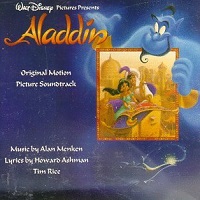 Film Soundtrack, 1992 (Walt Disney Records)
Film Soundtrack, 1992 (Walt Disney Records)  (3 / 5) Following the immense success of The Little Mermaid and Beauty and the Beast, Disney Animation firmly solidified what is now known as “The Disney Renaissance” with the critical and financial success of Aladdin in 1992. All three films featured scores with music by Alan Menken and lyrics by Howard Ashman, previously best known for their work on Little Shop of Horrors. Ashman envisioned Aladdin, the story of a teenage hoodlum who happens upon a magic lamp containing a genie, as a madcap romp set in the Middle East. But Ashman succumbed to complications from AIDS before he could finish work on the project, and some of the songs he co-wrote were ultimately not used. In fact, only three songs with lyrics by Ashman remain in the film — “Arabian Nights,” “Friend Like Me,” and “Prince Ali” — with Tim Rice providing lyrics for two additions, “One Jump Ahead” and “A Whole New World.” If Rice’s lyrics don’t have the same level of wit and character as Ashman’s, they’re still fun and don’t feel like a jarring departure. This is a very enjoyable recording, and it boasts what remains the best vocal leads of any Aladdin recording. Brad Kane is a charismatic Aladdin, blending well with Lea Salonga’s Princess Jasmine on the Oscar-winning “A Whole New World,” and Robin Williams is definitive as the genie of the lamp. Note: The deluxe edition of this soundtrack album includes bonus tracks of Howard Ashman singing demos for two songs cut from the film, the moving “Proud of Your Boy” and the fun “High Adventure.” — Matt Koplik
(3 / 5) Following the immense success of The Little Mermaid and Beauty and the Beast, Disney Animation firmly solidified what is now known as “The Disney Renaissance” with the critical and financial success of Aladdin in 1992. All three films featured scores with music by Alan Menken and lyrics by Howard Ashman, previously best known for their work on Little Shop of Horrors. Ashman envisioned Aladdin, the story of a teenage hoodlum who happens upon a magic lamp containing a genie, as a madcap romp set in the Middle East. But Ashman succumbed to complications from AIDS before he could finish work on the project, and some of the songs he co-wrote were ultimately not used. In fact, only three songs with lyrics by Ashman remain in the film — “Arabian Nights,” “Friend Like Me,” and “Prince Ali” — with Tim Rice providing lyrics for two additions, “One Jump Ahead” and “A Whole New World.” If Rice’s lyrics don’t have the same level of wit and character as Ashman’s, they’re still fun and don’t feel like a jarring departure. This is a very enjoyable recording, and it boasts what remains the best vocal leads of any Aladdin recording. Brad Kane is a charismatic Aladdin, blending well with Lea Salonga’s Princess Jasmine on the Oscar-winning “A Whole New World,” and Robin Williams is definitive as the genie of the lamp. Note: The deluxe edition of this soundtrack album includes bonus tracks of Howard Ashman singing demos for two songs cut from the film, the moving “Proud of Your Boy” and the fun “High Adventure.” — Matt Koplik
 Original Broadway Cast, 2014 (Walt Disney Records)
Original Broadway Cast, 2014 (Walt Disney Records)  (3 / 5) The success of Aladdin as an animated film led to a stage adaptation two decades later. The good news is that the results were far more successful than many other Disney transfers, though with some caveats. Choosing to underline Ashman’s original concept of presenting the story as a zany romp, the Broadway Aladdin is shinier, zippier, and sillier than the film. But while the show benefits from the inclusion of three songs with lyrics by Ashman that did not make it into the movie (“Proud of Your Boy,” “High Adventure,” and “Babkak, Omar, Aladdin, Hassim”), Chad Beguelin’s libretto isn’t quite clever enough to hold it all together. Although this is less of a problem on the cast recording than it was on a stage, enough of Beguelin’s meta-commentary jokes are peppered throughout the album (“Everyone here has a minor in dance!”) to make you roll your eyes. On the bright side, the score is given loving treatment in Danny Troob’s vibrant orchestrations and Michael Kosarin’s tight vocal arrangements. The one major misstep is turning the Genie’s “Friend Like Me” into a nearly 10-minute-long production number. While it’s performed energetically by James Monroe Iglehart, the song now feels overstuffed and tiresome. Iglehart is given a much better opportunity with “Prince Ali,” which has also been expanded from the film version, but to more satisfying effect. New additions to the score, such as “These Palace Walls” and “A Million Miles Away,” are pleasant enough, with Menken once again proving his gift for ear worms, but Beguelin’s lyrics are not on the same level as his predecessors’. Adam Jacobs gives an earnest performance as Aladdin, which works in ballads like “Proud of Your Boy” and “A Whole New World” but less well in peppier songs like “One Jump Ahead.” Courtney Reed’s Jasmine is mostly serviceable, though her voice is not as comfortable a fit for “A Whole New World” as Lea Salonga’s. And in a fun bit of déjà vu, Jonathan Freeman vamps it up as the evil villain Jafar, the part he voiced in the 1992 film. If this recording doesn’t have the overall charm of the original soundtrack, it’s still enjoyable, and it introduces audiences to some wonderful Ashman/Menken songs that had previously gone unheard. — M.K.
(3 / 5) The success of Aladdin as an animated film led to a stage adaptation two decades later. The good news is that the results were far more successful than many other Disney transfers, though with some caveats. Choosing to underline Ashman’s original concept of presenting the story as a zany romp, the Broadway Aladdin is shinier, zippier, and sillier than the film. But while the show benefits from the inclusion of three songs with lyrics by Ashman that did not make it into the movie (“Proud of Your Boy,” “High Adventure,” and “Babkak, Omar, Aladdin, Hassim”), Chad Beguelin’s libretto isn’t quite clever enough to hold it all together. Although this is less of a problem on the cast recording than it was on a stage, enough of Beguelin’s meta-commentary jokes are peppered throughout the album (“Everyone here has a minor in dance!”) to make you roll your eyes. On the bright side, the score is given loving treatment in Danny Troob’s vibrant orchestrations and Michael Kosarin’s tight vocal arrangements. The one major misstep is turning the Genie’s “Friend Like Me” into a nearly 10-minute-long production number. While it’s performed energetically by James Monroe Iglehart, the song now feels overstuffed and tiresome. Iglehart is given a much better opportunity with “Prince Ali,” which has also been expanded from the film version, but to more satisfying effect. New additions to the score, such as “These Palace Walls” and “A Million Miles Away,” are pleasant enough, with Menken once again proving his gift for ear worms, but Beguelin’s lyrics are not on the same level as his predecessors’. Adam Jacobs gives an earnest performance as Aladdin, which works in ballads like “Proud of Your Boy” and “A Whole New World” but less well in peppier songs like “One Jump Ahead.” Courtney Reed’s Jasmine is mostly serviceable, though her voice is not as comfortable a fit for “A Whole New World” as Lea Salonga’s. And in a fun bit of déjà vu, Jonathan Freeman vamps it up as the evil villain Jafar, the part he voiced in the 1992 film. If this recording doesn’t have the overall charm of the original soundtrack, it’s still enjoyable, and it introduces audiences to some wonderful Ashman/Menken songs that had previously gone unheard. — M.K.
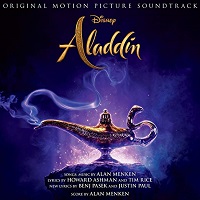 Film Soundtrack, 2019 (Walt Disney Records)
Film Soundtrack, 2019 (Walt Disney Records)  (1 / 5) This is the soundtrack recording of Disney’s recent live action remake of Aladdin, a trend the company has continued ever since the massive financial success it had with its remake of Beauty and the Beast. The Aladdin soundtrack is not nearly the disaster that Beast was: the arrangements are mostly similar to the originals (though some pop and hip hop influenced percussion has been added), and the cast is of a higher vocal caliber (if still auto-tuned). Yet, the recording is mostly free of personality; everything is clear and pleasant enough, but it’s missing energy and character. Nowhere is this more evident than in Will Smith’s performance as the Genie. Whereas both Robin Williams and James Monroe Iglehart gave everything they had to the role, Smith goes for a more laid back, casual approach to the magical sidekick. This is a mistake, and though he doesn’t completely bungle his two big songs, “Friend Like Me” and “Prince Ali,” they barely register here. Mena Massoud and Naomi Scott are both fine as, respectively, Aladdin and Princess Jasmine, but they certainly don’t wipe away memories of their predecessors in these roles. Scott has been given a new number written by Menken with lyrics by Benj Pasek and Justin Paul, “Speechless,” but the lyrics are so nondescript and the melody so jarringly different from the rest of the score that it doesn’t do anything to distinguish Scott’s Jasmine from Salonga’s or Reed’s. So, while this isn’t the worst soundtrack of a Disney remake, it’s the blandest of all three Aladdin recordings and is really more for completists than for anyone who want to be exposed to the score for the first time. — M.K.
(1 / 5) This is the soundtrack recording of Disney’s recent live action remake of Aladdin, a trend the company has continued ever since the massive financial success it had with its remake of Beauty and the Beast. The Aladdin soundtrack is not nearly the disaster that Beast was: the arrangements are mostly similar to the originals (though some pop and hip hop influenced percussion has been added), and the cast is of a higher vocal caliber (if still auto-tuned). Yet, the recording is mostly free of personality; everything is clear and pleasant enough, but it’s missing energy and character. Nowhere is this more evident than in Will Smith’s performance as the Genie. Whereas both Robin Williams and James Monroe Iglehart gave everything they had to the role, Smith goes for a more laid back, casual approach to the magical sidekick. This is a mistake, and though he doesn’t completely bungle his two big songs, “Friend Like Me” and “Prince Ali,” they barely register here. Mena Massoud and Naomi Scott are both fine as, respectively, Aladdin and Princess Jasmine, but they certainly don’t wipe away memories of their predecessors in these roles. Scott has been given a new number written by Menken with lyrics by Benj Pasek and Justin Paul, “Speechless,” but the lyrics are so nondescript and the melody so jarringly different from the rest of the score that it doesn’t do anything to distinguish Scott’s Jasmine from Salonga’s or Reed’s. So, while this isn’t the worst soundtrack of a Disney remake, it’s the blandest of all three Aladdin recordings and is really more for completists than for anyone who want to be exposed to the score for the first time. — M.K.
Ain’t Too Proud: The Life and Times of the Temptations
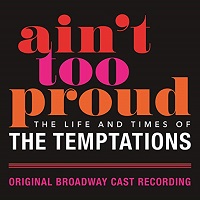 Original Broadway Cast, 2019 (Universal Music)
Original Broadway Cast, 2019 (Universal Music)  (5 / 5) There’s always a sense of déjà vu when a jukebox musical opens on Broadway, as most people walk in humming the tunes. If Ain’t Too Proud: The Life and Times of the Temptations doubles that feeling, it might be due to another “ain’t” from distant memory: Ain’t Misbehavin’, the first jukebox revue to take home the Tony Award for Best Musical. Ain’t Too Proud offers audiences just what that 1978 show did, with great songs delivered in great performances. Praised for its spirited direction (Des McAnuff), clever book (Dominique Morisseau), and high-voltage choreography by Sergio Trujillo, who took home a Tony for his work, Ain’t Too Proud also delivers the goods in its cast recording. The energy of what’s being performed eight times a week at the Imperial Theatre is all here in an album made up of more than two dozen Temptations songs, featuring the one-of-a-kind Detroit rock & roll rhythms and harmonies for which the group became famous. Highlights include such favorites as “My Girl,” “Just My Imagination,” “Get Ready,” and “Papa Was a Rolling Stone.” As the show’s storytelling reveals, there were more than a few “Temps” over the course of the group’s long career besides its original foursome. But Derrick Baskin, James Harkness, Jawan M. Jackson, Jeremy Pope, and Ephraim Sykes stand front and center, leading a tremendously talented cast. The recording also offers a good deal of interstitial narrative, directly from the show’s book, that aids in the appreciation of the story. (Of course, if you so choose, you can eliminate those tracks and custom design the album for your own listening pleasure). Mention should also be made of the fine orchestrations by Harold Wheeler, who at age 75 had his legendary, 50-year Broadway career capped with a special 2019 Tony Award for his contribution to the American musical. — Ron Fassler
(5 / 5) There’s always a sense of déjà vu when a jukebox musical opens on Broadway, as most people walk in humming the tunes. If Ain’t Too Proud: The Life and Times of the Temptations doubles that feeling, it might be due to another “ain’t” from distant memory: Ain’t Misbehavin’, the first jukebox revue to take home the Tony Award for Best Musical. Ain’t Too Proud offers audiences just what that 1978 show did, with great songs delivered in great performances. Praised for its spirited direction (Des McAnuff), clever book (Dominique Morisseau), and high-voltage choreography by Sergio Trujillo, who took home a Tony for his work, Ain’t Too Proud also delivers the goods in its cast recording. The energy of what’s being performed eight times a week at the Imperial Theatre is all here in an album made up of more than two dozen Temptations songs, featuring the one-of-a-kind Detroit rock & roll rhythms and harmonies for which the group became famous. Highlights include such favorites as “My Girl,” “Just My Imagination,” “Get Ready,” and “Papa Was a Rolling Stone.” As the show’s storytelling reveals, there were more than a few “Temps” over the course of the group’s long career besides its original foursome. But Derrick Baskin, James Harkness, Jawan M. Jackson, Jeremy Pope, and Ephraim Sykes stand front and center, leading a tremendously talented cast. The recording also offers a good deal of interstitial narrative, directly from the show’s book, that aids in the appreciation of the story. (Of course, if you so choose, you can eliminate those tracks and custom design the album for your own listening pleasure). Mention should also be made of the fine orchestrations by Harold Wheeler, who at age 75 had his legendary, 50-year Broadway career capped with a special 2019 Tony Award for his contribution to the American musical. — Ron Fassler
The Band’s Visit
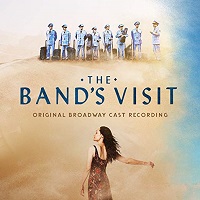 Original Broadway Cast, 2017 (Ghostlight)
Original Broadway Cast, 2017 (Ghostlight)  (5 / 5) Stranded in an Israeli desert town by mistake, an Egyptian band stays overnight with the locals before heading on to their engagement. Composer-lyricist David Yazbek has created a luminous score that highlights not the differences between these strangers, but their commonality, mankind’s shared needs for love and connection. The music incorporates klezmer influences and American jazz, but especially Arabic folk and classical idioms and instruments: the oud, riq, and darbouka. Katrina Lenk’s nuanced voice brings life to the role of cafe owner Dina; she and her friends offer the Egyptians a heaping dish of sarcasm and watermelon in “Welcome to Nowhere.” (Their sleepy village has more “blah, blah, blah” than that Gershwin song.) “It Is What It Is” hints at Dina’s history, but the haunting “Omar Sharif” reveals more, describing how young Dina and her mother adored Sharif movies and the exotic singing of Oum Kaltoum. This admission resonates with Tewfiq, the Egyptian band’s buttoned-up conductor (Tony Shaloub). His single solo is an a cappella number in Arabic, “Itgara’a,” hinting at inner sorrows. Yazbek deftly slides the concluding phrase of “Itgara’a” into Dina’s response, “Something Different.” The other Egyptians also forge bonds with the Israelis, often through music. “The Beat of Your Heart” is an exuberant memory song, evoking how former musician Avrum (Andrew Polk) met his late wife; Camal (George Abud) and Simon (Alok Tewari) joyfully add their violin and clarinet. The awkward Papi (Etai Benson) relates his trouble with girls in the hilarious “Papi Hears the Ocean,” so Haled (Ari’el Stachel) advises him in the style of his idol, Chet Baker (“Haled’s Song About Love””). Camal accompanies Itzik (John Cariani) as he soothes his child in “Itzik’s Lullaby.” The transcendent “Answer Me” concludes the vocals, sung by the “Telephone Guy” (Adam Kantor), who’s forever waiting by the village’s single pay phone in the hope that his girlfriend will call. For a few glorious seconds, the entire company joins in, reflecting the basic human need for connection. Like the Telephone Guy, our ears are “thirsty” for more of that. – Laura Frankos
(5 / 5) Stranded in an Israeli desert town by mistake, an Egyptian band stays overnight with the locals before heading on to their engagement. Composer-lyricist David Yazbek has created a luminous score that highlights not the differences between these strangers, but their commonality, mankind’s shared needs for love and connection. The music incorporates klezmer influences and American jazz, but especially Arabic folk and classical idioms and instruments: the oud, riq, and darbouka. Katrina Lenk’s nuanced voice brings life to the role of cafe owner Dina; she and her friends offer the Egyptians a heaping dish of sarcasm and watermelon in “Welcome to Nowhere.” (Their sleepy village has more “blah, blah, blah” than that Gershwin song.) “It Is What It Is” hints at Dina’s history, but the haunting “Omar Sharif” reveals more, describing how young Dina and her mother adored Sharif movies and the exotic singing of Oum Kaltoum. This admission resonates with Tewfiq, the Egyptian band’s buttoned-up conductor (Tony Shaloub). His single solo is an a cappella number in Arabic, “Itgara’a,” hinting at inner sorrows. Yazbek deftly slides the concluding phrase of “Itgara’a” into Dina’s response, “Something Different.” The other Egyptians also forge bonds with the Israelis, often through music. “The Beat of Your Heart” is an exuberant memory song, evoking how former musician Avrum (Andrew Polk) met his late wife; Camal (George Abud) and Simon (Alok Tewari) joyfully add their violin and clarinet. The awkward Papi (Etai Benson) relates his trouble with girls in the hilarious “Papi Hears the Ocean,” so Haled (Ari’el Stachel) advises him in the style of his idol, Chet Baker (“Haled’s Song About Love””). Camal accompanies Itzik (John Cariani) as he soothes his child in “Itzik’s Lullaby.” The transcendent “Answer Me” concludes the vocals, sung by the “Telephone Guy” (Adam Kantor), who’s forever waiting by the village’s single pay phone in the hope that his girlfriend will call. For a few glorious seconds, the entire company joins in, reflecting the basic human need for connection. Like the Telephone Guy, our ears are “thirsty” for more of that. – Laura Frankos
Beetlejuice
 Original Broadway Cast, 2019 (Ghostlight)
Original Broadway Cast, 2019 (Ghostlight)  (4 / 5) How far will a musical go to give you a good time? In the case of Beetlejuice, all the way to the Netherworld and back. Based on Tim Burton’s cult ’80s classic movie of the same title, the show centers around its title character, a fast-talking and wisecracking demon who helps a recently deceased couple try and scare away the family that’s recently moved into their home (though he has his own agenda for doing so). While Burton’s film famously delivered its morbidity with a wry sense of humor that earned it a PG rating, the musical adaptation takes a much zanier, PG-13/R approach. Eddie Perfect’s score has some classic Broadway flourishes sprinkled throughout, but it mostly leans to ’80s-style pop and musical theater faux-rock, which Kris Kukul elevates with his rollicking arrangements and orchestrations. Perfect’s lyrics are also reasonably well crafted, walking the line between wit and crassness. As Beetlejuice, the endlessly energetic Alex Brightman heavily indulges in vocal fry (as a respectful nod to Michael Keaton’s performance in the film) and devours songs like “The Whole ‘Being Dead’ Thing” and “Say My Name” to enjoyable effect. Kerry Butler and Rob McClure are also terrific as the recently deceased couple, Barbara and Adam. They embrace their characters’ intentional blandness in “Ready, Set, Not Yet” without being bland themselves, giving Brightman even more comedic fodder to play with in all of their tracks together. Leslie Kritzer is delightfully wacky as Delia; her “No Reason” duet with Sophia Ann Caruso’s Lydia has some of Perfect’s best lyrics, and is a major highlight of the recording. As the death-obsessed Lydia, Caruso displays a thrillingly unique voice that’s put to good use in her solos “Dead Mom” and “Home.” Enjoyable as the album is, there’s one gripe: Because the score is so eager to entertain, most of the extremely lively songs are packed back to back against each other, and are given no room to breathe. This makes for a rather overwhelming listening experience, with some numbers offering diminishing returns (“Creepy Old Guy” and “That Beautiful Sound” for example). The album may also repel listeners who wanted a more direct replica of the movie, or who prefer their musical comedy without references to cocaine and “ghost zombie Jesus.” But those who are willing to accept Beetlejuice on its own terms are in for a highly entertaining listen. — Matt Koplik
(4 / 5) How far will a musical go to give you a good time? In the case of Beetlejuice, all the way to the Netherworld and back. Based on Tim Burton’s cult ’80s classic movie of the same title, the show centers around its title character, a fast-talking and wisecracking demon who helps a recently deceased couple try and scare away the family that’s recently moved into their home (though he has his own agenda for doing so). While Burton’s film famously delivered its morbidity with a wry sense of humor that earned it a PG rating, the musical adaptation takes a much zanier, PG-13/R approach. Eddie Perfect’s score has some classic Broadway flourishes sprinkled throughout, but it mostly leans to ’80s-style pop and musical theater faux-rock, which Kris Kukul elevates with his rollicking arrangements and orchestrations. Perfect’s lyrics are also reasonably well crafted, walking the line between wit and crassness. As Beetlejuice, the endlessly energetic Alex Brightman heavily indulges in vocal fry (as a respectful nod to Michael Keaton’s performance in the film) and devours songs like “The Whole ‘Being Dead’ Thing” and “Say My Name” to enjoyable effect. Kerry Butler and Rob McClure are also terrific as the recently deceased couple, Barbara and Adam. They embrace their characters’ intentional blandness in “Ready, Set, Not Yet” without being bland themselves, giving Brightman even more comedic fodder to play with in all of their tracks together. Leslie Kritzer is delightfully wacky as Delia; her “No Reason” duet with Sophia Ann Caruso’s Lydia has some of Perfect’s best lyrics, and is a major highlight of the recording. As the death-obsessed Lydia, Caruso displays a thrillingly unique voice that’s put to good use in her solos “Dead Mom” and “Home.” Enjoyable as the album is, there’s one gripe: Because the score is so eager to entertain, most of the extremely lively songs are packed back to back against each other, and are given no room to breathe. This makes for a rather overwhelming listening experience, with some numbers offering diminishing returns (“Creepy Old Guy” and “That Beautiful Sound” for example). The album may also repel listeners who wanted a more direct replica of the movie, or who prefer their musical comedy without references to cocaine and “ghost zombie Jesus.” But those who are willing to accept Beetlejuice on its own terms are in for a highly entertaining listen. — Matt Koplik
Amélie
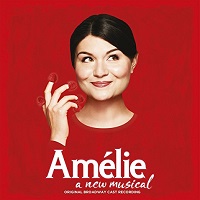 Original Broadway Cast, 2017 (Rhino Warner Classics)
Original Broadway Cast, 2017 (Rhino Warner Classics)  (1 / 5) The 2001 Jean-Pierre Jeunet film Amélie caused a major resurgence in American audiences’ interest in French cinema and at least briefly made a star of its leading lady, Audrey Tatou. Set in Paris, the film tells of an introvert who decides to do random acts of good deeds for her fellow Parisians while maintaining her distance so as not to actually get involved with the messiness of real life. The film is recalled by many as purely airy and whimsical, remembered largely for its fantastical imagery and Tatou’s impish charm. The stage musical follows the movie very closely in plot and structure, and has a very talented cast at its disposal. Unfortunately, writers Daniel Messé, Nathan Tyson, and Craig Lucas don’t seem to have realized that Amélie also deals with disappointment, grief, and loneliness, none of which comes across in the show or on this album. It doesn’t help that the score by Messé and Tyson aims more for a contemporary musical theater sound than for a classically French one. (There is no accordion to be heard in Bruce Coughlin’s orchestrations). Two of the least effective songs in the score are “Goodbye Amélie” and “A Better Haircut,” which are meant to be comedic relief but instead come across as glaringly wrongheaded. Some of the other songs begin with fascinating, ethereal introductions that give hope for what’s to come, but then the songs themselves seem to evaporate, never delivering on the promise of the intros and the incidental music. In the title role, Phillipa Soo is surprisingly dry and often restrained by the score’s inability to properly showcase her mellifluous voice. She is, however, given strong support by a diverse cast that gives everything they can to add some spunk to the show. Sometimes they succeed, as in songs like “World’s Best Dad” or “Times Are Hard For Dreamers,” but these are small victories in an inoffensive yet undistinguished adaptation. — Matt Koplik
(1 / 5) The 2001 Jean-Pierre Jeunet film Amélie caused a major resurgence in American audiences’ interest in French cinema and at least briefly made a star of its leading lady, Audrey Tatou. Set in Paris, the film tells of an introvert who decides to do random acts of good deeds for her fellow Parisians while maintaining her distance so as not to actually get involved with the messiness of real life. The film is recalled by many as purely airy and whimsical, remembered largely for its fantastical imagery and Tatou’s impish charm. The stage musical follows the movie very closely in plot and structure, and has a very talented cast at its disposal. Unfortunately, writers Daniel Messé, Nathan Tyson, and Craig Lucas don’t seem to have realized that Amélie also deals with disappointment, grief, and loneliness, none of which comes across in the show or on this album. It doesn’t help that the score by Messé and Tyson aims more for a contemporary musical theater sound than for a classically French one. (There is no accordion to be heard in Bruce Coughlin’s orchestrations). Two of the least effective songs in the score are “Goodbye Amélie” and “A Better Haircut,” which are meant to be comedic relief but instead come across as glaringly wrongheaded. Some of the other songs begin with fascinating, ethereal introductions that give hope for what’s to come, but then the songs themselves seem to evaporate, never delivering on the promise of the intros and the incidental music. In the title role, Phillipa Soo is surprisingly dry and often restrained by the score’s inability to properly showcase her mellifluous voice. She is, however, given strong support by a diverse cast that gives everything they can to add some spunk to the show. Sometimes they succeed, as in songs like “World’s Best Dad” or “Times Are Hard For Dreamers,” but these are small victories in an inoffensive yet undistinguished adaptation. — Matt Koplik
Bandstand
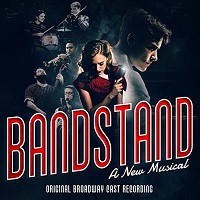 Original Broadway Cast, 2017 (Broadway Records)
Original Broadway Cast, 2017 (Broadway Records)  (3 / 5) In Bandstand, composer Richard Oberacker and Robert Taylor, who co-wrote the book and lyrics with Oberacker, created an original musical set in the 1940s, but with echoes that resonate today. At its heart is newly discharged WWII veteran Donny Novitski (Corey Cott). Though the show opens with people proclaiming that everything will be “Just Like It Was Before” the war, this is obviously not true; Donny can’t find work in his old haunts, Cleveland’s jazz clubs, and he’s plagued with PTSD. A “Tribute to the Troops” competition inspires him to form a band of his former brothers-in-arms. With braggadocio covering desperation, Cott turns “Donny Novitski” into a character-defining piece, as he hopes his project will “block out the mem’ries.” The group assembles in the zippy “I Know a Guy,” and it’s clear that all of them carry mental and/or physical scars from the war. They’re joined by Julia Trojan (Laura Osnes), the widow of Donny’s war buddy, who just happens to be a singer and a poet. Osnes’s silvery tones and the extraordinary level of nuance she packs into her singing are highlighted in several numbers, from a song about Julia’s struggles as a Gold Star wife (“Who I Was”) to the torchy “Love Will Come and Find Me Again.” The latter deftly works on several dramatic levels: as a diegetic performance piece, an indication of the increasing attraction between Donny and Julia, and a reflection of her emotional growth. Beth Leavel adds depth to any show, so one wishes she had more to do as Julia’s mother, but she does get to deliver the second act powerhouse “Everything Happens.” Some tracks on the album showcase the vocal and instrumental talents of the other band members: Alex Bender, Joe Carroll, Brandon J. Ellis, James Nathan Hopkins, and Geoff Packard. Running through the orchestrations by Bill Elliott and Greg Anthony Rassen are variations on Gene Krupa’s fabled drum rhythms — first as explosions in a war flashback, then haunting Donny’s nightmares, and finally as the pulsing beat of New York City. Bandstand’s plot wraps up a bit too conveniently, but this recording has a good deal to offer. — Laura Frankos
(3 / 5) In Bandstand, composer Richard Oberacker and Robert Taylor, who co-wrote the book and lyrics with Oberacker, created an original musical set in the 1940s, but with echoes that resonate today. At its heart is newly discharged WWII veteran Donny Novitski (Corey Cott). Though the show opens with people proclaiming that everything will be “Just Like It Was Before” the war, this is obviously not true; Donny can’t find work in his old haunts, Cleveland’s jazz clubs, and he’s plagued with PTSD. A “Tribute to the Troops” competition inspires him to form a band of his former brothers-in-arms. With braggadocio covering desperation, Cott turns “Donny Novitski” into a character-defining piece, as he hopes his project will “block out the mem’ries.” The group assembles in the zippy “I Know a Guy,” and it’s clear that all of them carry mental and/or physical scars from the war. They’re joined by Julia Trojan (Laura Osnes), the widow of Donny’s war buddy, who just happens to be a singer and a poet. Osnes’s silvery tones and the extraordinary level of nuance she packs into her singing are highlighted in several numbers, from a song about Julia’s struggles as a Gold Star wife (“Who I Was”) to the torchy “Love Will Come and Find Me Again.” The latter deftly works on several dramatic levels: as a diegetic performance piece, an indication of the increasing attraction between Donny and Julia, and a reflection of her emotional growth. Beth Leavel adds depth to any show, so one wishes she had more to do as Julia’s mother, but she does get to deliver the second act powerhouse “Everything Happens.” Some tracks on the album showcase the vocal and instrumental talents of the other band members: Alex Bender, Joe Carroll, Brandon J. Ellis, James Nathan Hopkins, and Geoff Packard. Running through the orchestrations by Bill Elliott and Greg Anthony Rassen are variations on Gene Krupa’s fabled drum rhythms — first as explosions in a war flashback, then haunting Donny’s nightmares, and finally as the pulsing beat of New York City. Bandstand’s plot wraps up a bit too conveniently, but this recording has a good deal to offer. — Laura Frankos
Come From Away
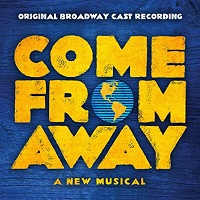 Original Broadway Cast, 2017 (The Musical Company)
Original Broadway Cast, 2017 (The Musical Company)  (3 / 5) Alhough they’ve been a songwriting team for years, husband and wife David Hein and Irene Sankoff made their Broadway debut with the musical Come From Away. The show is based on the true story of a small Newfoundland town’s locals taking in more than 7,000 passengers from diverted airplanes on 9/11/2001, offering food, clothing, and shelter without a moment’s hesitation. At first glance, Come From Away shouldn’t work; Hein and Sankoff’s lyrics are often rough, and their book tends to lean heavily on exposition. Plus, the subject matter, though not directly about the events of 9/11, does deal with consequences of the tragedy. But for all of of that, the show succeeds — largely because, despite wearing its heart on its sleeve, Come From Away never feels forced or overly earnest. If Hein and Sankoff are not great lyricists, their music, orchestrated with pulsing vitality by August Eriksmoen, is remarkably inventive and thrilling; and their book, though understandably truncated on the album, employs a great deal of intelligence and a surprising amount of humor to win over the audience. With charmingly honest performances by an excellent ensemble cast, the album provides a strong representation of these effects, even if also underlines some of the show’s rougher elements. First-time listeners may roll their eyes during pedestrian moments such as “Lead Us Out of the Night” or “Costume Party,” but by the time they get to the roof raising “Screech In,” they’ll likely find themselves leaning into the show’s charm and enjoying the rest of the recording. They might even wipe away a tear or two. — Matt Koplik
(3 / 5) Alhough they’ve been a songwriting team for years, husband and wife David Hein and Irene Sankoff made their Broadway debut with the musical Come From Away. The show is based on the true story of a small Newfoundland town’s locals taking in more than 7,000 passengers from diverted airplanes on 9/11/2001, offering food, clothing, and shelter without a moment’s hesitation. At first glance, Come From Away shouldn’t work; Hein and Sankoff’s lyrics are often rough, and their book tends to lean heavily on exposition. Plus, the subject matter, though not directly about the events of 9/11, does deal with consequences of the tragedy. But for all of of that, the show succeeds — largely because, despite wearing its heart on its sleeve, Come From Away never feels forced or overly earnest. If Hein and Sankoff are not great lyricists, their music, orchestrated with pulsing vitality by August Eriksmoen, is remarkably inventive and thrilling; and their book, though understandably truncated on the album, employs a great deal of intelligence and a surprising amount of humor to win over the audience. With charmingly honest performances by an excellent ensemble cast, the album provides a strong representation of these effects, even if also underlines some of the show’s rougher elements. First-time listeners may roll their eyes during pedestrian moments such as “Lead Us Out of the Night” or “Costume Party,” but by the time they get to the roof raising “Screech In,” they’ll likely find themselves leaning into the show’s charm and enjoying the rest of the recording. They might even wipe away a tear or two. — Matt KoplikBright Star
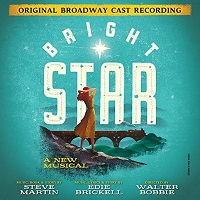 Original Broadway Cast, 2016 (Ghostlight)
Original Broadway Cast, 2016 (Ghostlight)  (2 / 5) Steve Martin is a man of many talents: actor, playwright, stand up comic, novelist. And here, with Edie Brickell as his collaborator, he adds musical theater writer to the list. Martin’s original story for Bright Star centers on both Billy Cane, a young Southern man striving to become a writer (A.J. Shively), and Alice Murphy, the austere female publisher who mentors him (Carmen Cusack). Due to the story’s setting and Martin’s familiarity with the genre, the score is written with a heavy bluegrass influence. (The reliable August Eriksmoen keeps the banjo plucking with his blood-pumping orchestrations.) Given Martin’s many previous successes, it’s a shame that Bright Star is such a mixed bag as a musical, and even more so as an album. While Martin and Brickell have a gift for writing music that can be quietly moving (“It Can’t Wait”) or enticingly catchy (“Another Round”), their lyrics prove to be a major obstacle that the score and the show can’t quite get past; they often lack adequate insight into characters’ psyches or fail to propel the plot forward, tending to be repetitive and broad. (“A Man’s Gotta Do” is a prime example.) The cast is strong overall, though the talents of Broadway veterans Dee Hoty and Stephen Bogardus are sadly wasted in small roles that get lost in large group numbers or throwaway songs like “She’s Gone.” Luckily, the album has radiant performances by Cusack as Alice and Paul Alexander Nolan as her childhood love. In their first song together, “Whoa Mama,” the recording begins to pick up steam as Cusack’s throaty alto blends beautifully with Nolan’s pure tenor, creating intimate chemistry. The other songs these two share together (“It Can’t Wait,” “What Could Be Better,” “I Had a Vision”) are further highlights of the album. Some of the remaining items are very pleasant listening (“Asheville,” “Bright Star”), but it’s only when Cusack and Nolan take focus that Bright Star actually becomes a bluegrass musical. — Matt Koplik
(2 / 5) Steve Martin is a man of many talents: actor, playwright, stand up comic, novelist. And here, with Edie Brickell as his collaborator, he adds musical theater writer to the list. Martin’s original story for Bright Star centers on both Billy Cane, a young Southern man striving to become a writer (A.J. Shively), and Alice Murphy, the austere female publisher who mentors him (Carmen Cusack). Due to the story’s setting and Martin’s familiarity with the genre, the score is written with a heavy bluegrass influence. (The reliable August Eriksmoen keeps the banjo plucking with his blood-pumping orchestrations.) Given Martin’s many previous successes, it’s a shame that Bright Star is such a mixed bag as a musical, and even more so as an album. While Martin and Brickell have a gift for writing music that can be quietly moving (“It Can’t Wait”) or enticingly catchy (“Another Round”), their lyrics prove to be a major obstacle that the score and the show can’t quite get past; they often lack adequate insight into characters’ psyches or fail to propel the plot forward, tending to be repetitive and broad. (“A Man’s Gotta Do” is a prime example.) The cast is strong overall, though the talents of Broadway veterans Dee Hoty and Stephen Bogardus are sadly wasted in small roles that get lost in large group numbers or throwaway songs like “She’s Gone.” Luckily, the album has radiant performances by Cusack as Alice and Paul Alexander Nolan as her childhood love. In their first song together, “Whoa Mama,” the recording begins to pick up steam as Cusack’s throaty alto blends beautifully with Nolan’s pure tenor, creating intimate chemistry. The other songs these two share together (“It Can’t Wait,” “What Could Be Better,” “I Had a Vision”) are further highlights of the album. Some of the remaining items are very pleasant listening (“Asheville,” “Bright Star”), but it’s only when Cusack and Nolan take focus that Bright Star actually becomes a bluegrass musical. — Matt Koplik
A Bronx Tale: The Musical
 Original Broadway Cast, 2017 (Ghostlight)
Original Broadway Cast, 2017 (Ghostlight)  (2 / 5) In 1989, Chazz Palminteri told the story of his youth in the Bronx as a one-man play, chronicling his conflicting loyalties to his working-class father, Lorenzo, and the charismatic local mob boss, Sonny. A 1993 film version starred Palminteri as Sonny and Robert De Niro, who directed, as Lorenzo. For the musical, Palminteri penned the libretto while De Niro co-directed with Broadway veteran Jerry Zaks. It conjures up memories of Jersey Boys (music, gangsters, lots of narration) and West Side Story (gritty neighborhoods in ethnic conflict, lovers from opposite sides). Alan Menken’s versatile score, evoking nearly every style of music heard on a transistor radio in the sixties, is the most enjoyable facet of A Bronx Tale. The composer returns to his Little Shop of Horrors doo-wop roots in the effective opener, “Belmont Avenue,” as Calogero (Bobby Conte Thornton) vividly describes the Italian-American neighborhood while “next year’s Frankie Vallis” harmonize on the corner. There’s a Sinatra-style swing tune (“One of the Great Ones”) for Sonny (a gruff yet sexy Nick Cordero), driving funk in “Hurt Someone,” a pop love duet (“Out of Your Head”), and Motown soul for the black neighborhood kids (“Webster Avenue”). Unfortunately, other than in the scene-setting descriptive numbers, Glenn Slater’s lyrics often rely on clichés and sentimentality. “Look To Your Heart” is a maudlin piece of advice given by Lorenzo (an underused Richard H. Blake) to young Calogero (Hudson Loverro, who holds his own with his elders); Lorenzo’s wife (Lucia Giannetta) reprises it, and the inescapable title phrase worms its way into other songs. Thornton and Ariana DeBose handle “Out of Your Head” well enough, but the lyrics could fit any generic pair of star-crossed lovers, while Cordero’s“Mack the Knife”-like ditty about “Nicky Machiavelli” is marred by some painful rhymes and syntax. Slater’s on better footing in “I Like It,” as young Calogero revels in the respect, free Cokes, and comic books that come with being Sonny’s favorite. The show concludes with “The Choices We Make,” and Lorenzo says, “It’s just another story.” One might wish it were told with more originality and verve. — Laura Frankos
(2 / 5) In 1989, Chazz Palminteri told the story of his youth in the Bronx as a one-man play, chronicling his conflicting loyalties to his working-class father, Lorenzo, and the charismatic local mob boss, Sonny. A 1993 film version starred Palminteri as Sonny and Robert De Niro, who directed, as Lorenzo. For the musical, Palminteri penned the libretto while De Niro co-directed with Broadway veteran Jerry Zaks. It conjures up memories of Jersey Boys (music, gangsters, lots of narration) and West Side Story (gritty neighborhoods in ethnic conflict, lovers from opposite sides). Alan Menken’s versatile score, evoking nearly every style of music heard on a transistor radio in the sixties, is the most enjoyable facet of A Bronx Tale. The composer returns to his Little Shop of Horrors doo-wop roots in the effective opener, “Belmont Avenue,” as Calogero (Bobby Conte Thornton) vividly describes the Italian-American neighborhood while “next year’s Frankie Vallis” harmonize on the corner. There’s a Sinatra-style swing tune (“One of the Great Ones”) for Sonny (a gruff yet sexy Nick Cordero), driving funk in “Hurt Someone,” a pop love duet (“Out of Your Head”), and Motown soul for the black neighborhood kids (“Webster Avenue”). Unfortunately, other than in the scene-setting descriptive numbers, Glenn Slater’s lyrics often rely on clichés and sentimentality. “Look To Your Heart” is a maudlin piece of advice given by Lorenzo (an underused Richard H. Blake) to young Calogero (Hudson Loverro, who holds his own with his elders); Lorenzo’s wife (Lucia Giannetta) reprises it, and the inescapable title phrase worms its way into other songs. Thornton and Ariana DeBose handle “Out of Your Head” well enough, but the lyrics could fit any generic pair of star-crossed lovers, while Cordero’s“Mack the Knife”-like ditty about “Nicky Machiavelli” is marred by some painful rhymes and syntax. Slater’s on better footing in “I Like It,” as young Calogero revels in the respect, free Cokes, and comic books that come with being Sonny’s favorite. The show concludes with “The Choices We Make,” and Lorenzo says, “It’s just another story.” One might wish it were told with more originality and verve. — Laura Frankos
Anastasia
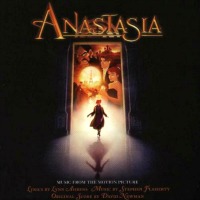 Film Soundtrack, 1997 (Atlantic)
Film Soundtrack, 1997 (Atlantic)  (2 / 5) Just as Disney Animation was beginning to see a decline in its musical renaissance in the mid-’90s, Fox Animation decided to try its hand with the Princess formula. The attempt resulted in Anastasia, an animated musical about the search for the Russian Grand Duchess, who was rumored for a time to still be alive after the Russian Revolution. At the center of it all is Anya, an orphan with amnesia. She’s roped into a ploy by con artists Dmitri and Vlad to pose as the lost Anastasia — only for the two to realize that Anya could actually be the Grand Duchess. A modest success in 1997, the movie is a fun diversion; but it takes ridiculously wild liberties with historical accuracy, going so far as to suggest that the Bolshevik Revolution was due to a magic spell cast by Grigori Rasputin, who comes back from the dead to seek revenge. What has gained the film a loyal following is the score by Broadway’s Lynn Ahrens (lyrics) and Stephen Flaherty (music). Considering how beloved that score has become — enough to lead to a Broadway incarnation 20 years later — it’s disappointing that this is not the team’s best work. Most of the songs are fine and enjoyable in themselves, but they lack any Russian flourish, and the score in general seems more designed to fit the Disney aesthetic than to create its own identity. However, two songs stand out: “Journey to the Past” and “Once Upon a December.” Both are sung definitively by Liz Callaway, and they receive an extra push from Doug Besterman’s orchestrations. These two tracks make the album worthwhile, even if the rest of the score is not of the same quality. — Matt Koplik
(2 / 5) Just as Disney Animation was beginning to see a decline in its musical renaissance in the mid-’90s, Fox Animation decided to try its hand with the Princess formula. The attempt resulted in Anastasia, an animated musical about the search for the Russian Grand Duchess, who was rumored for a time to still be alive after the Russian Revolution. At the center of it all is Anya, an orphan with amnesia. She’s roped into a ploy by con artists Dmitri and Vlad to pose as the lost Anastasia — only for the two to realize that Anya could actually be the Grand Duchess. A modest success in 1997, the movie is a fun diversion; but it takes ridiculously wild liberties with historical accuracy, going so far as to suggest that the Bolshevik Revolution was due to a magic spell cast by Grigori Rasputin, who comes back from the dead to seek revenge. What has gained the film a loyal following is the score by Broadway’s Lynn Ahrens (lyrics) and Stephen Flaherty (music). Considering how beloved that score has become — enough to lead to a Broadway incarnation 20 years later — it’s disappointing that this is not the team’s best work. Most of the songs are fine and enjoyable in themselves, but they lack any Russian flourish, and the score in general seems more designed to fit the Disney aesthetic than to create its own identity. However, two songs stand out: “Journey to the Past” and “Once Upon a December.” Both are sung definitively by Liz Callaway, and they receive an extra push from Doug Besterman’s orchestrations. These two tracks make the album worthwhile, even if the rest of the score is not of the same quality. — Matt Koplik
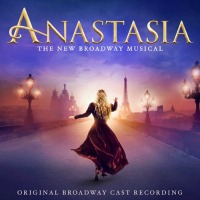 Original Broadway Cast, 2017 (Broadway Records)
Original Broadway Cast, 2017 (Broadway Records)  (3 / 5) Twenty years after its premiere in movie theaters, Anastasia arrived on Broadway with Ahrens and Flaherty expanding upon their original score and Terrence McNally coming in to add a more serious approach and historical context to the piece. However, in trying to honor the animated film as well as give the musical a more realistic perspective, the team came up with a stage musical of uneven quality. “Journey to the Past” and “Once Upon A December” remain high points, with Christy Altomare a more than worthy successor to Callaway, though the smaller Broadway orchestrations — once again by Doug Besterman — do them a slight disservice. And while Ahrens and Flaherty have been able to add a few welcome numbers to flesh out the characters (“My Petersburg” and “In a Crowd of Thousands”), these and other new songs feel disconnected from the ’90s originals in tone and style. Also, Ramin Karimloo, while serving as a more realistic villain than the film’s Rasputin, is sadly wasted as Gleb, a Russian officer in the new regime. His rich tenor is underused in the score’s two blandest new entries, “Still” and “The Neva Flows.” That said, this album is a much more fulfilling listening experience than the film soundtrack. And Altomare is a charming Anya, while Caroline O’Connor and Mary Beth Peil respectively bring jolts of energy and gravitas to their roles of the Countess Lily and the Dowager Empress. — M.K.
(3 / 5) Twenty years after its premiere in movie theaters, Anastasia arrived on Broadway with Ahrens and Flaherty expanding upon their original score and Terrence McNally coming in to add a more serious approach and historical context to the piece. However, in trying to honor the animated film as well as give the musical a more realistic perspective, the team came up with a stage musical of uneven quality. “Journey to the Past” and “Once Upon A December” remain high points, with Christy Altomare a more than worthy successor to Callaway, though the smaller Broadway orchestrations — once again by Doug Besterman — do them a slight disservice. And while Ahrens and Flaherty have been able to add a few welcome numbers to flesh out the characters (“My Petersburg” and “In a Crowd of Thousands”), these and other new songs feel disconnected from the ’90s originals in tone and style. Also, Ramin Karimloo, while serving as a more realistic villain than the film’s Rasputin, is sadly wasted as Gleb, a Russian officer in the new regime. His rich tenor is underused in the score’s two blandest new entries, “Still” and “The Neva Flows.” That said, this album is a much more fulfilling listening experience than the film soundtrack. And Altomare is a charming Anya, while Caroline O’Connor and Mary Beth Peil respectively bring jolts of energy and gravitas to their roles of the Countess Lily and the Dowager Empress. — M.K.
Cagney
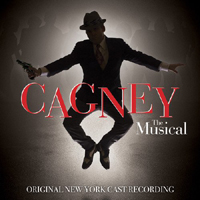 Original Off-Broadway Cast, 2016 (Broadway Records)
Original Off-Broadway Cast, 2016 (Broadway Records)  (2 / 5) First seen at the York Theatre Company’s home at St. Peter’s Church and then in a commercial run at the Westside Theatre, this show was a crowd pleaser largely for Joshua Bergasse’s exciting, tap-heavy choreography, which obviously cannot be experienced via the cast album. But the recording is still worth hearing for the enjoyable score by Robert Creighton and Christopher McGovern, and for Creighton’s dynamic performance in the title role: James Cagney (1899-1986), who started as a song and dance man in vaudeville and went on to huge fame for his tough-guy roles in such movies as The Public Enemy, Angels With Dirty Faces, and White Heat. Another major character in the show is studio mogul Jack L. Warner (Bruce Sabath), who in the opening number, “Black and White,” boasts of taking “a shrimp with pride from the Lower East Side” and turning him into “the greatest tough-guy the silver screen ever saw.” Indeed, the contentious relationship between Cagney and Warner provides much of the show’s dramatic energy, and one of its best sequences deals with the mid-career triumph Cagney achieved when he played legendary songwriter/performer George M. Cohan in the Warner Bros. biopic Yankee Doodle Dandy. Highlights of the Creighton/McGovern score include the charming “Falling in Love,” in which Cagney and his future wife (played by Ellen Zolezzi) find it difficult to say the “L” word, and Cagney’s introspective second-act solos, “How Will I Be Remembered?” and “Tough Guy.” Also included are two Cohan songs that were featured in Yankee Doodle Dandy: “Grand Old Flag,” for the Act I finale, and the title song, for the epilogue. The recording would have benefited from a larger orchestra (only five players here), but it’s entertaining for the stronger moments of the score and the performances of Creighton and the rest of the cast, which also includes Jeremy Benton, Danette Holden, and Josh Walden in multiple roles. — Michael Portantiere
(2 / 5) First seen at the York Theatre Company’s home at St. Peter’s Church and then in a commercial run at the Westside Theatre, this show was a crowd pleaser largely for Joshua Bergasse’s exciting, tap-heavy choreography, which obviously cannot be experienced via the cast album. But the recording is still worth hearing for the enjoyable score by Robert Creighton and Christopher McGovern, and for Creighton’s dynamic performance in the title role: James Cagney (1899-1986), who started as a song and dance man in vaudeville and went on to huge fame for his tough-guy roles in such movies as The Public Enemy, Angels With Dirty Faces, and White Heat. Another major character in the show is studio mogul Jack L. Warner (Bruce Sabath), who in the opening number, “Black and White,” boasts of taking “a shrimp with pride from the Lower East Side” and turning him into “the greatest tough-guy the silver screen ever saw.” Indeed, the contentious relationship between Cagney and Warner provides much of the show’s dramatic energy, and one of its best sequences deals with the mid-career triumph Cagney achieved when he played legendary songwriter/performer George M. Cohan in the Warner Bros. biopic Yankee Doodle Dandy. Highlights of the Creighton/McGovern score include the charming “Falling in Love,” in which Cagney and his future wife (played by Ellen Zolezzi) find it difficult to say the “L” word, and Cagney’s introspective second-act solos, “How Will I Be Remembered?” and “Tough Guy.” Also included are two Cohan songs that were featured in Yankee Doodle Dandy: “Grand Old Flag,” for the Act I finale, and the title song, for the epilogue. The recording would have benefited from a larger orchestra (only five players here), but it’s entertaining for the stronger moments of the score and the performances of Creighton and the rest of the cast, which also includes Jeremy Benton, Danette Holden, and Josh Walden in multiple roles. — Michael Portantiere
Curtains
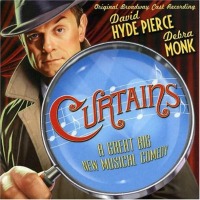 Original Broadway Cast, 2007 (Manhattan Records)
Original Broadway Cast, 2007 (Manhattan Records)  (2 / 5) Part backstage satire and part whodunit, Curtains was a long-gestating property. At the time of its opening, the show was touted as having the last original score by the legendary team of lyricist Fred Ebb, who died in 2004, and composer John Kander. (Whatever the order of composition, it turned out that the team’s adventurously rewarding The Scottsboro Boys and The Visit both premiered in later years.) Peter Stone, who died in 2003, is credited with the original book and concept of Curtains; Rupert Holmes, who already had “whodunit” experience with Drood, came in to help restructure the book and to work with Kander on writing some additional lyrics. The result is a modestly entertaining piece, but it doesn’t have quite enough bite to succeed as satire or enough intrigue to succeed as a murder mystery. Centered on a Broadway-bound musical that’s experiencing out-of-town woes, Curtains opens with the mysterious murder of the show’s lame leading lady (a hilarious Patty Goble). The cast and production team are up in arms trying to figure out who the culprit is while simultaneously attempting to improve their show so it won’t meet the same deadly fate at the hands of the New York critics. At the center of it all is theater-crazed detective Lieutenant Frank Cioffi, played with boyish charm by David Hyde Pierce. The star is supported by a strong cast including Debra Monk as the show-within-the-show’s gruff producer; Edward Hibbert as the catty director; and Karen Ziemba and Jason Danieley as the songwriting team, once married but now divorced. The cast works their magic — especially entertaining is Monk’s delivery of her character’s hard-as-nails mantra, “It’s a Business” — but the material is rarely up to the intelligence or melodic zeal of previous Kander and Ebb scores. The always reliable William David Brohn provides orchestrations that practically come with their own pair of jazz hands, but they aren’t able to elevate Kander’s music beyond the level of stylishly presentable. Although Curtains is a pleasant diversion from the darker K&E works, it will not likely stay with you for long. — Matt Koplik
(2 / 5) Part backstage satire and part whodunit, Curtains was a long-gestating property. At the time of its opening, the show was touted as having the last original score by the legendary team of lyricist Fred Ebb, who died in 2004, and composer John Kander. (Whatever the order of composition, it turned out that the team’s adventurously rewarding The Scottsboro Boys and The Visit both premiered in later years.) Peter Stone, who died in 2003, is credited with the original book and concept of Curtains; Rupert Holmes, who already had “whodunit” experience with Drood, came in to help restructure the book and to work with Kander on writing some additional lyrics. The result is a modestly entertaining piece, but it doesn’t have quite enough bite to succeed as satire or enough intrigue to succeed as a murder mystery. Centered on a Broadway-bound musical that’s experiencing out-of-town woes, Curtains opens with the mysterious murder of the show’s lame leading lady (a hilarious Patty Goble). The cast and production team are up in arms trying to figure out who the culprit is while simultaneously attempting to improve their show so it won’t meet the same deadly fate at the hands of the New York critics. At the center of it all is theater-crazed detective Lieutenant Frank Cioffi, played with boyish charm by David Hyde Pierce. The star is supported by a strong cast including Debra Monk as the show-within-the-show’s gruff producer; Edward Hibbert as the catty director; and Karen Ziemba and Jason Danieley as the songwriting team, once married but now divorced. The cast works their magic — especially entertaining is Monk’s delivery of her character’s hard-as-nails mantra, “It’s a Business” — but the material is rarely up to the intelligence or melodic zeal of previous Kander and Ebb scores. The always reliable William David Brohn provides orchestrations that practically come with their own pair of jazz hands, but they aren’t able to elevate Kander’s music beyond the level of stylishly presentable. Although Curtains is a pleasant diversion from the darker K&E works, it will not likely stay with you for long. — Matt Koplik
Adding Machine
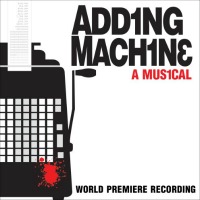 Original Off-Broadway Cast, 2008 (P.S. Classics)
Original Off-Broadway Cast, 2008 (P.S. Classics)  (3 / 5) You might think The Adding Machine, Elmer Rice’s 1923 expressionist drama, an unlikely candidate for musical adaptation. It’s a bleak tale of a bigoted, downtrodden bookkeeper who kills his boss and is executed, ending up in the Elysian Fields, where recycling doesn’t mean reusing plastic bottles. Thankfully, Joshua Schmidt (music and book) and Jason Loewith (book) took on the challenge, and this recording recreates most of the largely sung-through show in all its nerve-jangling dissonance. Joel Hatch is outstanding as the bookkeeper, Mr. Zero — so obnoxious that you know he deserves his fate, yet so thick, you understand how he got that way. Hatch conveys Zero’s character through the staccato snarls of Schmidt and Loewith’s lyrics, full of blunt, monosyllabic statements. The joys in Zero’s life are few, but he relishes them, whether it’s the “Ham and Eggs” his harridan wife (the marvelously caustic Cyrilla Baer) brings for his final meal, or recalling their few moments of wedded bliss in “Didn’t We?” But rage smolders within his confused mind, crowded with endless figures. When his boss crushes his fantasy of promotion (“Movin’ Up”), telling him that he’s being replaced by an adding machine, Zero stabs him. In the afterlife, Zero encounters two souls he knew while alive: his assistant, Daisy (Amy Warren), and fellow inmate Shrdlu (Joe Ferrell). Both get songs that break up the harsh score — a gooey love ditty for Daisy, and a gospel rouser for religious nut Shrdlu, detailing his mother’s murder and the hellish torments he expects for his crime. Most of the score is intentionally jarring; piano, synthesizer, and percussion bang into the brain while the repetitive chorus provides a counterpoint of chanted numbers and echoed lyrics. It’s exactly the right tone for Rice’s piece, though you probably won’t find yourself playing this one often because of the shrillness. — Laura Frankos
(3 / 5) You might think The Adding Machine, Elmer Rice’s 1923 expressionist drama, an unlikely candidate for musical adaptation. It’s a bleak tale of a bigoted, downtrodden bookkeeper who kills his boss and is executed, ending up in the Elysian Fields, where recycling doesn’t mean reusing plastic bottles. Thankfully, Joshua Schmidt (music and book) and Jason Loewith (book) took on the challenge, and this recording recreates most of the largely sung-through show in all its nerve-jangling dissonance. Joel Hatch is outstanding as the bookkeeper, Mr. Zero — so obnoxious that you know he deserves his fate, yet so thick, you understand how he got that way. Hatch conveys Zero’s character through the staccato snarls of Schmidt and Loewith’s lyrics, full of blunt, monosyllabic statements. The joys in Zero’s life are few, but he relishes them, whether it’s the “Ham and Eggs” his harridan wife (the marvelously caustic Cyrilla Baer) brings for his final meal, or recalling their few moments of wedded bliss in “Didn’t We?” But rage smolders within his confused mind, crowded with endless figures. When his boss crushes his fantasy of promotion (“Movin’ Up”), telling him that he’s being replaced by an adding machine, Zero stabs him. In the afterlife, Zero encounters two souls he knew while alive: his assistant, Daisy (Amy Warren), and fellow inmate Shrdlu (Joe Ferrell). Both get songs that break up the harsh score — a gooey love ditty for Daisy, and a gospel rouser for religious nut Shrdlu, detailing his mother’s murder and the hellish torments he expects for his crime. Most of the score is intentionally jarring; piano, synthesizer, and percussion bang into the brain while the repetitive chorus provides a counterpoint of chanted numbers and echoed lyrics. It’s exactly the right tone for Rice’s piece, though you probably won’t find yourself playing this one often because of the shrillness. — Laura Frankos
An American in Paris
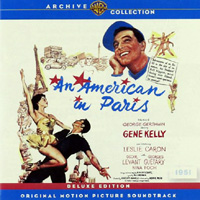 Film Soundtrack, 1951 (MGM/Rhino-Turner/Watertower Music)
Film Soundtrack, 1951 (MGM/Rhino-Turner/Watertower Music)  (5 / 5) In the 1990s, Turner Entertainment restored one of MGM’s greatest musicals, An American In Paris. The restoration turned up the studio session tapes of the all-Gershwin score, which led to Turner teaming with Rhino Records to release a two-disc album stuffed full of the music heard in the film as well as outtakes, underscoring, and extended and alternate versions of songs. That 1996 CD is now out of print, but in 2015, Watertower Music made it available digitally through their Warner Archives series. The songs in the film, nearly all part of the Great American Songbook, are performed by an engaging trio: Gene Kelly as Jerry Mulligan, a war vet and aspiring painter; Oscar Levant as Adam Cook, an acerbic composer; and Georges Guetary as Henri Baurel, a song-and-dance man. Kelly is at his charming best teaching English to a gaggle of Parisian kids through “I Got Rhythm” and earnestly expressing his passion for Leslie Caron in “Love Is Here To Stay.” He joins Guetary in proclaiming the joys of love (for the same girl, though they don’t know it) in “‘S Wonderful,” and goofs with Levant on “Tra-la-la.” Guetary solos in a “(I’ll Build A) Stairway To Paradise,” so rousing that you expect showgirls to parade through your room. The soundtrack is capped by the MGM Studio Orchestra, up-sized to 72 players and conducted by Johnny Green, performing the glorious 16-minute “An American In Paris Ballet.” Added material includes underscoring and medleys by the studio orchestra and Benny Green and his band, along with outtakes such as Kelly’s heartfelt “I’ve Got a Crush On You” and an incredible set of Gershwin improvisations by Levant, who was a lifelong friend of Gershwin and one of his finest interpreters. The improvs got deleted from the film in favor of another treasure, Levant’s brilliant — and in the film, highly comic — rendition of the “Concerto in F (Third Movement).” This is one of the two pieces in stereo on the album; if this album has any drawbacks, it’s the fact that most of the session tapes didn’t survive in multi-channel format, so almost all of the music is presented here in mono. But that’s a quibble. It all adds up to nearly two hours of pure Gershwin(s), and as Ira wrote, “Who could ask for anything more?” —Laura Frankos
(5 / 5) In the 1990s, Turner Entertainment restored one of MGM’s greatest musicals, An American In Paris. The restoration turned up the studio session tapes of the all-Gershwin score, which led to Turner teaming with Rhino Records to release a two-disc album stuffed full of the music heard in the film as well as outtakes, underscoring, and extended and alternate versions of songs. That 1996 CD is now out of print, but in 2015, Watertower Music made it available digitally through their Warner Archives series. The songs in the film, nearly all part of the Great American Songbook, are performed by an engaging trio: Gene Kelly as Jerry Mulligan, a war vet and aspiring painter; Oscar Levant as Adam Cook, an acerbic composer; and Georges Guetary as Henri Baurel, a song-and-dance man. Kelly is at his charming best teaching English to a gaggle of Parisian kids through “I Got Rhythm” and earnestly expressing his passion for Leslie Caron in “Love Is Here To Stay.” He joins Guetary in proclaiming the joys of love (for the same girl, though they don’t know it) in “‘S Wonderful,” and goofs with Levant on “Tra-la-la.” Guetary solos in a “(I’ll Build A) Stairway To Paradise,” so rousing that you expect showgirls to parade through your room. The soundtrack is capped by the MGM Studio Orchestra, up-sized to 72 players and conducted by Johnny Green, performing the glorious 16-minute “An American In Paris Ballet.” Added material includes underscoring and medleys by the studio orchestra and Benny Green and his band, along with outtakes such as Kelly’s heartfelt “I’ve Got a Crush On You” and an incredible set of Gershwin improvisations by Levant, who was a lifelong friend of Gershwin and one of his finest interpreters. The improvs got deleted from the film in favor of another treasure, Levant’s brilliant — and in the film, highly comic — rendition of the “Concerto in F (Third Movement).” This is one of the two pieces in stereo on the album; if this album has any drawbacks, it’s the fact that most of the session tapes didn’t survive in multi-channel format, so almost all of the music is presented here in mono. But that’s a quibble. It all adds up to nearly two hours of pure Gershwin(s), and as Ira wrote, “Who could ask for anything more?” —Laura Frankos
 Original Broadway Cast, 2015 (Sony Masterworks Broadway)
Original Broadway Cast, 2015 (Sony Masterworks Broadway)  (4 / 5) Some Gershwin fans may have been wary when they heard of plans to turn the beloved film An American in Paris into a stage musical, filled out with other numbers by George and Ira. Previous attempts to create “new” Gershwin shows through similar methods had had decidedly mixed results; just look at My One And Only, Crazy For You, and Nice Work If You Can Get It. (On second thought, please don’t look at Nice Work If You Can Get It.) But in this case, the outcome was far better. Librettist Craig Lucas, director Christopher Wheeldon, and musical supervisor/arranger Rob Fisher crafted a show that takes its inspiration from the film but wisely doesn’t try to replicate it. Only five numbers — the “Concerto in F,” “I Got Rhythm,” “‘S Wonderful,” “Stairway to Paradise,” and the title ballet — are in both the movie and the show, and the interpolations were chosen with an eye toward how well they fit the plot and characters. In the stage musical, the time of the action is shifted to the immediate post-WWII years, with Paris recovering both spiritually and physically. That’s clear in the first ensemble number, “I Got Rhythm,” when Henri Baurel (Max von Essen) tells composer Adam Hochberg (Brandon Uranowitz), “People need to laugh. Paris needs it.” By the song’s end, Henri has brought a snappy 4/4 beat to Adam’s dirge-like melody, and the pair have become fast friends with another fellow vet, painter Jerry Mulligan (Robert Fairchild). Enter Lise Dassin (Leanne Cope), a young ballerina destined to become the love object of all three men — another departure from the film. It’s a nice touch, making Adam much more than comic relief, and Uranowitz’s heartbreaking take on “But Not For Me” is one of the cast recording’s highlights. The full trio of male leads also provides lovely harmonies, both joyful (“‘S Wonderful”) and poignant (the 11 o’clocker “They Can’t Take That Away From Me”). Fairchild has an engaging warmth that’s most evident in “I’ve Got Beginner’s Luck” and “Liza” but also comes through in the bits of dialogue on the recording. In the film, the female roles of Lise and Jerry’s patroness, Milo, don’t get any vocals, but that’s not the case here. Cope gives us a yearning “The Man I Love” and pairs well with Fairchild on one of the Gershwins’ sweetest ballads, “For You, For Me, For Evermore.” Jill Paice, as Milo, provides sophistication and sultriness in “Shall We Dance?” and a glimpse into her heart in “But Not For Me.” As in the film, it’s the concert pieces that really complete the whole, beautifully orchestrated here by Christopher Austin; the title ballet and the “Concerto in F” (the show’s opening) are joined by the “Second Prelude” and the first act finale, which includes the “Second Rhapsody” and the “Cuban Overture.” This cast album doesn’t replace the soundtrack, but it’s not meant to. It has its own merits. — L.F.
(4 / 5) Some Gershwin fans may have been wary when they heard of plans to turn the beloved film An American in Paris into a stage musical, filled out with other numbers by George and Ira. Previous attempts to create “new” Gershwin shows through similar methods had had decidedly mixed results; just look at My One And Only, Crazy For You, and Nice Work If You Can Get It. (On second thought, please don’t look at Nice Work If You Can Get It.) But in this case, the outcome was far better. Librettist Craig Lucas, director Christopher Wheeldon, and musical supervisor/arranger Rob Fisher crafted a show that takes its inspiration from the film but wisely doesn’t try to replicate it. Only five numbers — the “Concerto in F,” “I Got Rhythm,” “‘S Wonderful,” “Stairway to Paradise,” and the title ballet — are in both the movie and the show, and the interpolations were chosen with an eye toward how well they fit the plot and characters. In the stage musical, the time of the action is shifted to the immediate post-WWII years, with Paris recovering both spiritually and physically. That’s clear in the first ensemble number, “I Got Rhythm,” when Henri Baurel (Max von Essen) tells composer Adam Hochberg (Brandon Uranowitz), “People need to laugh. Paris needs it.” By the song’s end, Henri has brought a snappy 4/4 beat to Adam’s dirge-like melody, and the pair have become fast friends with another fellow vet, painter Jerry Mulligan (Robert Fairchild). Enter Lise Dassin (Leanne Cope), a young ballerina destined to become the love object of all three men — another departure from the film. It’s a nice touch, making Adam much more than comic relief, and Uranowitz’s heartbreaking take on “But Not For Me” is one of the cast recording’s highlights. The full trio of male leads also provides lovely harmonies, both joyful (“‘S Wonderful”) and poignant (the 11 o’clocker “They Can’t Take That Away From Me”). Fairchild has an engaging warmth that’s most evident in “I’ve Got Beginner’s Luck” and “Liza” but also comes through in the bits of dialogue on the recording. In the film, the female roles of Lise and Jerry’s patroness, Milo, don’t get any vocals, but that’s not the case here. Cope gives us a yearning “The Man I Love” and pairs well with Fairchild on one of the Gershwins’ sweetest ballads, “For You, For Me, For Evermore.” Jill Paice, as Milo, provides sophistication and sultriness in “Shall We Dance?” and a glimpse into her heart in “But Not For Me.” As in the film, it’s the concert pieces that really complete the whole, beautifully orchestrated here by Christopher Austin; the title ballet and the “Concerto in F” (the show’s opening) are joined by the “Second Prelude” and the first act finale, which includes the “Second Rhapsody” and the “Cuban Overture.” This cast album doesn’t replace the soundtrack, but it’s not meant to. It has its own merits. — L.F.
American Psycho
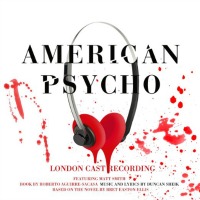 Original London Cast, 2016 (Concord Records)
Original London Cast, 2016 (Concord Records)  (4 / 5) Duncan Sheik’s score for this musical adaptation of Bret Easton Ellis’ savage (in all senses of the word), satiric novel marvelously captures the musical vibe of the go-go 1980s, when “greed was good.” It helps that interpolated into the show’s score are some of the decade’s big hits — for example, Tears for Fears’ “Everybody Wants to Rule the World,” Phil Collins’ “In the Air Tonight” — which have been terrifically re-conceived for a theatrical storytelling mode. What’s not always so successful is Sheik’s attempt to capture the book’s biting humor. In certain numbers (“You Are What You Wear,”) his work as lyricist zings, communicating the characters’ sense of entitlement while also commenting on their vapidity. Other songs — like “Mistletoe Alert” which attempts a similar dual purpose — fall flat on this original London cast recording, without the visuals that audiences encountered in the theater. As a record of the musical, the album provides an intriguing glimpse of it “in process.” Before American Psycho transferred from London to Broadway, new numbers were written and the song order was changed; for those who saw the show during its brief run in New York, it’s fascinating to listen to this OLCR and hear how the narrative became more direct in the journey across the Atlantic. (Roberto Aguirre-Sacasa wrote the book for the musical.) In the unlikely event that a Broadway cast recording is ever released, it will probably overshadow this one, thanks to the changes and Benjamin Walker’s electrifying performance as Patrick Bateman. Until then, this album will have to suffice, and listeners will find that Sheik’s energetic melodies seem to demand repeated plays. — Andy Propst
(4 / 5) Duncan Sheik’s score for this musical adaptation of Bret Easton Ellis’ savage (in all senses of the word), satiric novel marvelously captures the musical vibe of the go-go 1980s, when “greed was good.” It helps that interpolated into the show’s score are some of the decade’s big hits — for example, Tears for Fears’ “Everybody Wants to Rule the World,” Phil Collins’ “In the Air Tonight” — which have been terrifically re-conceived for a theatrical storytelling mode. What’s not always so successful is Sheik’s attempt to capture the book’s biting humor. In certain numbers (“You Are What You Wear,”) his work as lyricist zings, communicating the characters’ sense of entitlement while also commenting on their vapidity. Other songs — like “Mistletoe Alert” which attempts a similar dual purpose — fall flat on this original London cast recording, without the visuals that audiences encountered in the theater. As a record of the musical, the album provides an intriguing glimpse of it “in process.” Before American Psycho transferred from London to Broadway, new numbers were written and the song order was changed; for those who saw the show during its brief run in New York, it’s fascinating to listen to this OLCR and hear how the narrative became more direct in the journey across the Atlantic. (Roberto Aguirre-Sacasa wrote the book for the musical.) In the unlikely event that a Broadway cast recording is ever released, it will probably overshadow this one, thanks to the changes and Benjamin Walker’s electrifying performance as Patrick Bateman. Until then, this album will have to suffice, and listeners will find that Sheik’s energetic melodies seem to demand repeated plays. — Andy Propst
Billy Elliot
 Original London Cast, 2006 (Decca Broadway)
Original London Cast, 2006 (Decca Broadway)  (2 / 5) Based on the film written by Lee Hall, who did double duty for the stage musical as librettist and lyricist, Billy Elliot tells of a Northern English boy who discovers a love for ballet but has to hide it from his family — including his father and brother, who are on strike with the miner’s union at the height of Thatcherism. A smash hit in London (this cast album represents that production) and on Broadway, Billy Elliot was a moving, theatrically exciting piece due in large part to its thrilling staging by director Stephen Daldry, who also directed the film, and choreographer Peter Darling. What becomes clear on the cast album, however, is the obstacle that Hall and Elton John faced with this project: How does one write a compelling musical theater score when your leading character only feels comfortable expressing himself through dance? Their answer was to create a score that more or less provided a platform for Daldry and Darling to leap from. This is not to say that the songs are bad; they do exactly what they need to do. Without the umbrella of Disney, Elton John produced some inventive melodies (e.g., “Solidarity”) that are given extra character by Martin Koch’s orchestrations, even if John occasionally tends to lean back into his specialty of pop power ballads that don’t quite fit the piece. Hall, a first time lyricist, does an admirable job of keeping the songs in the language of the working class characters. Due to the physical demands of the title role, three young actors rotated as Billy in the original London production (and on Broadway), though only one, Liam Mower, is heard on this recording. Mower does a fine job, as does the rest of the cast, most notably a crackling Hayden Gwynne as the dance teacher who guides Billy out of his shell. Listeners who haven’t seen the show may wonder why Billy Elliot was such a phenomenon; the answer is that this musical, even more than most others, truly needs to be seen to be experienced. — Matt Koplik
(2 / 5) Based on the film written by Lee Hall, who did double duty for the stage musical as librettist and lyricist, Billy Elliot tells of a Northern English boy who discovers a love for ballet but has to hide it from his family — including his father and brother, who are on strike with the miner’s union at the height of Thatcherism. A smash hit in London (this cast album represents that production) and on Broadway, Billy Elliot was a moving, theatrically exciting piece due in large part to its thrilling staging by director Stephen Daldry, who also directed the film, and choreographer Peter Darling. What becomes clear on the cast album, however, is the obstacle that Hall and Elton John faced with this project: How does one write a compelling musical theater score when your leading character only feels comfortable expressing himself through dance? Their answer was to create a score that more or less provided a platform for Daldry and Darling to leap from. This is not to say that the songs are bad; they do exactly what they need to do. Without the umbrella of Disney, Elton John produced some inventive melodies (e.g., “Solidarity”) that are given extra character by Martin Koch’s orchestrations, even if John occasionally tends to lean back into his specialty of pop power ballads that don’t quite fit the piece. Hall, a first time lyricist, does an admirable job of keeping the songs in the language of the working class characters. Due to the physical demands of the title role, three young actors rotated as Billy in the original London production (and on Broadway), though only one, Liam Mower, is heard on this recording. Mower does a fine job, as does the rest of the cast, most notably a crackling Hayden Gwynne as the dance teacher who guides Billy out of his shell. Listeners who haven’t seen the show may wonder why Billy Elliot was such a phenomenon; the answer is that this musical, even more than most others, truly needs to be seen to be experienced. — Matt Koplik
The Book of Mormon
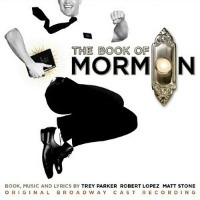 Original Broadway Cast, 2011 (Ghostlight)
Original Broadway Cast, 2011 (Ghostlight)  (4 / 5) When it was announced that the creators of South Park were writing a Broadway musical, with one of the songwriters of Avenue Q, no less, everyone expected that the show was going to be both shocking and hilarious. But the surprise here was that Trey Parker and Matt Stone (South Park) and Robert Lopez (Avenue Q) wrote a stellar musical comedy that was traditional in many ways. Yes, it’s shocking in its profanity and contemporary in its subject matter: two missionaries go to Uganda in the hope of converting villagers to Mormonism. But rather than try to reinvent the wheel with The Book of Mormon, Parker, Stone, and Lopez chose to adhere to tried and true musical theater structure in the style of the Golden Age, and to have fun within it. The cast is strong, each member giving a fully defined, wonderfully well sung performance. Andrew Rannells and Josh Gad, as the two central Mormon characters, make a good team, with Rannells doing the majority of the vocal heavy lifting. Gad is also a strong singer, though his comedic antics can occasionally be grating. Robert Lopez proved with Avenue Q that he has an ear for melody, but here his work is even more inventive while being filled with musical pop culture references to everything from the Osmonds in “All-American Prophet” to The Lion King (a running joke in the show) in “Hasa Diga Eebowai.” Each song has a distinct flavor, and yet the score doesn’t feel disjointed. Stephen Oremus’s orchestrations –played by 23 musicians on the cast album, as compared to nine in the production — match Lopez’s level of invention. As is the case with the best musical comedies, because the score is so reliant on the book, not every song shines as brightly on the recording as it does in the theater (for example, “Making Things Up Again”). But this a minor gripe. The lyrics — by Parker and Stone, with contributions from Lopez — are crass, colorful, and hilarious, yet with a surprising amount of heart. The show wouldn’t have worked if the creators had decided to be condescending to their characters and to the audience, but thankfully, this was not the case. — Matt Koplik
(4 / 5) When it was announced that the creators of South Park were writing a Broadway musical, with one of the songwriters of Avenue Q, no less, everyone expected that the show was going to be both shocking and hilarious. But the surprise here was that Trey Parker and Matt Stone (South Park) and Robert Lopez (Avenue Q) wrote a stellar musical comedy that was traditional in many ways. Yes, it’s shocking in its profanity and contemporary in its subject matter: two missionaries go to Uganda in the hope of converting villagers to Mormonism. But rather than try to reinvent the wheel with The Book of Mormon, Parker, Stone, and Lopez chose to adhere to tried and true musical theater structure in the style of the Golden Age, and to have fun within it. The cast is strong, each member giving a fully defined, wonderfully well sung performance. Andrew Rannells and Josh Gad, as the two central Mormon characters, make a good team, with Rannells doing the majority of the vocal heavy lifting. Gad is also a strong singer, though his comedic antics can occasionally be grating. Robert Lopez proved with Avenue Q that he has an ear for melody, but here his work is even more inventive while being filled with musical pop culture references to everything from the Osmonds in “All-American Prophet” to The Lion King (a running joke in the show) in “Hasa Diga Eebowai.” Each song has a distinct flavor, and yet the score doesn’t feel disjointed. Stephen Oremus’s orchestrations –played by 23 musicians on the cast album, as compared to nine in the production — match Lopez’s level of invention. As is the case with the best musical comedies, because the score is so reliant on the book, not every song shines as brightly on the recording as it does in the theater (for example, “Making Things Up Again”). But this a minor gripe. The lyrics — by Parker and Stone, with contributions from Lopez — are crass, colorful, and hilarious, yet with a surprising amount of heart. The show wouldn’t have worked if the creators had decided to be condescending to their characters and to the audience, but thankfully, this was not the case. — Matt Koplik

